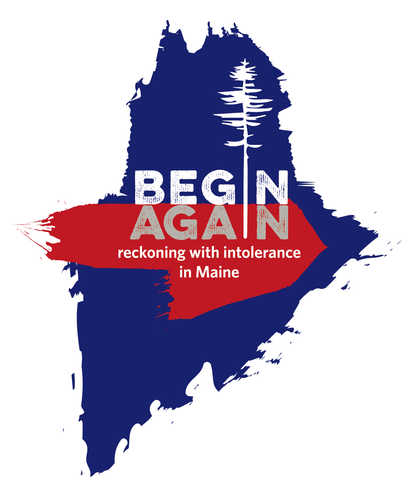(Page 1 of 9) Print Version
Begin Again: reckoning with intolerance in Maine was Installed May 27, 2021 through December 31, 2021 at Maine Historical Society's gallery in Portland. This online component expands content with Maine Memory Network items and differs slightly from the physical installation.
Curated by Anne B. Gass, Independent scholar and women's rights history activist; Tilly Laskey, curator at the Maine Historical Society; Darren J. Ranco PhD (Penobscot), Chair of Native American Programs, Associate Professor of Anthropology, Coordinator of Native American Research, University of Maine;
and Krystal Williams, Attorney and Executive Advisor, Providentia Group.
Advisors include: Ryan Adams, Matthew Jude Barker; John Banks (Penobscot); Mary L. Bonauto; Rhea Cote Robbins; Lelia DeAndrade; Angus Ferguson; David Freidenreich; Seth Goldstein; Michael-Corey F. Hinton (Passamaquoddy); Dr. Andrea Louie; Kristina Minister, PhD; Sherri Mitchell (Penobscot); Alivia Moore (Penobscot); Jennifer Neptune (Penobscot); Garrett Stewart; Charmagne Tripp; and Arisa White.
Begin Again is brought to you with generous support from: Jane's Trust, The Morton-Kelly Charitable Trust, Unum, Elsie A. Brown Fund, Inc., Maine Humanities Council, Margaret E. Burnham Charitable Trust, The Phineas W. Sprague Memorial Foundation, and the William Sloane Jelin Foundation.
Exhibition contents and navigation
Page 1 Introduction Page 2 Just Powers
Path A: Page 3 Life, Liberty, and the Pursuit of Happiness--Path A Page 4 All men are created equal--Path A Page 5 We mutually pledge to each other our Lives, our Fortunes and our sacred Honor--Path A
Path B: Page 6 Life, Liberty, and the Pursuit of Happiness--Path B Page 7 All men are created equal--Path B Page 8 We mutually pledge to each other our Lives, our Fortunes and our sacred Honor--Path B
Page 9 Maine Historical Society and reckoning with museums as colonial institutions
View the virtual exhibition through a 3-D online experience.
Terminology
Indigenous/Native/Native American/Indian--the first people of what is now known as the Americas.
Wabanaki—the first people of Maine encompassing the Abenaki, Maliseet, Micmac, Passamaquoddy, and Penobscot Nations.
Black—People of African descent and African Americans.
Colonialism—a policy of stealing political control over another country, occupying it with settlers, and exploiting it economically.
Settler colonialism—a system that replaces the original population of the colonized territory with a new society of settlers through theft and force.
Triangular Trade/Atlantic Slave Trade—an economic system where merchants traded goods like rum and guns for enslaved people in Africa, who were sailed to the Americas as forced labor. The raw products of slave labor were traded for slaves and also shipped to New England for processing and sale.
White—descendants of European and English settler colonialists and those benefiting from Whiteness.
Begin Again: reckoning with intolerance in Maine
A pandemic, political unrest, race-based violence, and drastic economic inequities in 2020 have spurred conversations about intolerance in America and Maine. During this crisis, many are asking, How did we get here? The answer is centuries old.
A year after Christopher Columbus's 1492 journey, Pope Alexander VI issued a Papal Bull that legalized stealing Indigenous land in what is now known as the Americas, justifying the genocide of non-Christians. A previous proclamation in 1452 approved the murder and enslavement of African people. These "Doctrines of Christian Discovery and Domination" are the foundation of settler colonialist supremacy woven into all aspects of American life, and are a basis of the legal, economic, and social systems.
The Doctrines propelled English and European settlements through theft of Indigenous Homelands starting in the 1600s. The Doctrines shaped the ideologies of the Framers of the U.S. Constitution, who, while writing "all men are created equal," suppressed women's rights, lived on stolen land, and profited from slavery. These ideologies remain present, and were cited in the U.S. Supreme Court as recently as 2005 in City of Sherrill, New York v. Oneida Indian Nation of New York.
The roots of why, in 2020, a White Minneapolis policeman was empowered to kneel on the neck of George Floyd, a Black man, in full public view for 9 minutes 29 seconds are traced to the fundamental intolerance in our society based in the Doctrines of Discovery. The question shouldn't be, How did we get here?, but rather, Where do we go from here?
This exhibition examines different paths of experiences in Maine. There are difficult histories to reckon with, and some items might shock visitors. In collaboration with a network of advisors from around the state, we invite you to view Maine's history plainly, to work toward healing through truth, and "Begin Again," envisioning a more equitable experience that we know is possible for all of Maine's residents in the future.
Friendly URL: https://www.mainememory.net/exhibits/beginagain







